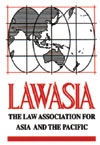 LAWASIA,
the Law Association for Asia and the Pacific, has observed with shock
recent developments in Malaysia that saw citizens (including members of
the legal profession) subject to considerable repression when seeking to
exercise their constitutional rights of freedom of assembly and freedom
of expression.
LAWASIA,
the Law Association for Asia and the Pacific, has observed with shock
recent developments in Malaysia that saw citizens (including members of
the legal profession) subject to considerable repression when seeking to
exercise their constitutional rights of freedom of assembly and freedom
of expression.
As
an association formed of nationally-representative law associations of
Asia and the Pacific region, it expresses its strong condemnation of the
actions of the Malaysian authorities in attempting to prevent the
planned BERSIH 2.0 rallies on 9 July and in subsequent police reaction
to the rallies that proceeded, according to reports, peacefully.
It
is especially concerned that reactions to the BERSIH movement are in
significant breach of fundamental human rights as set out in the Universal
Declaration of Human Rights, which provide, at Article 19 that:
Everyone has the right to freedom of opinion and expression; this right
includes freedom to hold opinions without interference and to seek,
receive and impart information and ideas through any media and
regardless of frontiers and at Article 20 (1) that: Everyone has the
right to freedom of peaceful assembly and association.
It
understands that actions by the authorities included arrests, some
under emergency provisions that allow for long detention without access
to due court processes, a shut-down of public access to areas of Kuala
Lumpur and elsewhere, and an eventual display of police brutality
against rallying citizens and others that was both uncivilised and
wholly unmerited.
Actions
of this sort in any country will always deserve the strongest criticism
from the legal community on both legal and humanitarian grounds.
Eyewitness
and media reports of events on 9 July have highlighted arrests of more
than 1600 people and alarmingly, an indiscriminate use of tear gas and
water cannon by police on participants in rallies that were at pains to
maintain a nonviolent and disciplined attitude. Of considerable concern
are further reports that haphazard crowd control methods employed by
police saw a hospital compound in Kuala Lumpur affected by both tear gas
and water cannon, an action for which there can be no justification.
Eyewitness
and media reports of events on 9 July have highlighted arrests of more
than 1600 people and alarmingly, an indiscriminate use of tear gas and
water cannon by police on participants in rallies that were at pains to
maintain a nonviolent and disciplined attitude. Of considerable concern
are further reports that haphazard crowd control methods employed by
police saw a hospital compound in Kuala Lumpur affected by both tear gas
and water cannon, an action for which there can be no justification.
In
respect of police action on and around 9 July, LAWASIA notes that the
Bar Council Malaysia, among others, has called for an independent
investigation by SUHAKAM, the Human Rights Commission of Malaysia. It
strongly supports this call for an independent assessment of the way in
which police executed their crowd control functions in this instance,
noting the Bar Council’s view that the actions of 9 July appear to
constitute a serious breach of the United Nations Basic Principles on the Use of Force and Firearms by Law Enforcement Officials, which Malaysia adopted in 1990.
LAWASIA
is further concerned to learn that arrests continue and that the
wearing of BERSIH livery is considered sufficient grounds for arrest.
Aside from the evident breaches of basic human rights this signifies, it
defies understanding than any government which claims to support the
democratic process can maintain credibility amongst voters when it feels
threatened to this extent by a movement whose stated aims and
activities are to promote clean and fair elections through
achievable reforms.
Above
all, LAWASIA encourages the Malaysian government to be mindful not only
of the rights of its citizens but also of the message that its actions
in respect of the BERSIH movement have sent to the wider world. The
queries over Malaysia’s fitness to hold a seat on the United Nations
Human Rights Council, in view of its apparent disdain for the
fundamental human rights of its citizenry aptly highlight international
concern that aspirations to hold political power now far outstrip an
adherence to the democratic principles on which the country was founded.
Given
the leading role that Malaysia plays in the Asia Pacific region, its
compliance with universally-held principles attached to human rights,
the democratic process and the rule of law is of supreme importance in
the examples it sets for lesser developed neighbour nations. It is of
profound regret to the regional legal community that reaction to the
BERSIH movement sees these principles cast aside, and of profound
concern what this may signify for Malaysia’s regional role in the
future.
Lester Huang
PRESIDENT
July 22, 2011
CONTACT: LAWASIA Secretariat
Tel: +61 7 3222 5888
Fax: +61 7 3222 5850
Email: lawasia@lawasia.asn.au

No comments:
Post a Comment